ECO mode Citroen JUMPY 2016 2.G Repair Manual
[x] Cancel search | Manufacturer: CITROEN, Model Year: 2016, Model line: JUMPY, Model: Citroen JUMPY 2016 2.GPages: 595, PDF Size: 12.47 MB
Page 502 of 595

500
During a call, press OK to display the
contextual menu.
In the contextual menu, select " End
call " to end the call.
Managing calls
Hang up
(so that the caller cannot hear)
In the contextual menu:
-
s
elect "Micro OFF " to switch off
the microphone.
-
d
eselect "Micro OFF " to switch
the microphone on. In the contextual menu:
-
s
elect "
Telephone mode " to
transfer the call to the telephone
(for example, to leave the vehicle
while continuing a conversation).
-
d
eselect "
Telephone mode " to
transfer the call to the vehicle.
Microphone off Telephone modeIf the contact has been cut off, when you
reconnect on returning to the vehicle,
the Bluetooth connection will be restored
automatically and sound returned to the
system (depending on the compatibility of the
telephone).
In some cases telephone mode must be
activated from the telephone. From the contextual menu, select
"
DTMF tones " and confirm to use
the digital keypad to navigate in the
interactive voice response menu.
From the contextual menu, select
" Switch " and confirm to return to a
call left on hold.
Interactive voice response
Dual call
Confirm with OK.
Confirm with OK. Confirm with OK.
Confirm with OK.
Confirm with OK.
Audio and Telematics
Page 504 of 595

502
The table below gives answers to the most frequently asked questions on your audio system.QUESTION ANSWER SOLUTION
With the engine off, the
audio system switches off
after a few minutes of use. When the engine is switched off, the audio system operating time
depends on the state of charge of the battery.
The switch-off is normal: the audio equipment switches to economy
mode and switches off to prevent discharging of the vehicle's
battery. Start the vehicle's engine to increase the battery
charge.
The message "the audio
system is overheated"
appears on the display. In order to protect the installation if the surrounding temperature
is too high, the audio system switches to an automatic thermal
protection mode leading to a reduction in volume or CD play
stopping. Switch the audio system off for a few minutes to
allow the system to cool.
Frequently asked questions
QUESTION
ANSWER SOLUTION
There is a difference in
sound quality between the
different audio sources
(radio, CD...). For optimum sound quality, the audio settings (Volume,Bass, Treble,
Ambience and Loudness) can be adapted to the different sound
sources, which may result in audible differences when changing
source (radio, CD...). Check that the audio settings (Volume, Bass,
Treble, Ambience and Loudness) are adapted to
the sources listened to. It is advisable to set the
audio functions (Bass, Treble, Front-Rear Balance
and Left-Right Balance) to the middle position,
select the musical ambience "None" and set the
loudness correction to the "Active" position in CD
mode or to the "Inactive" position in radio mode.
Radio
Audio and Telematics
Page 505 of 595
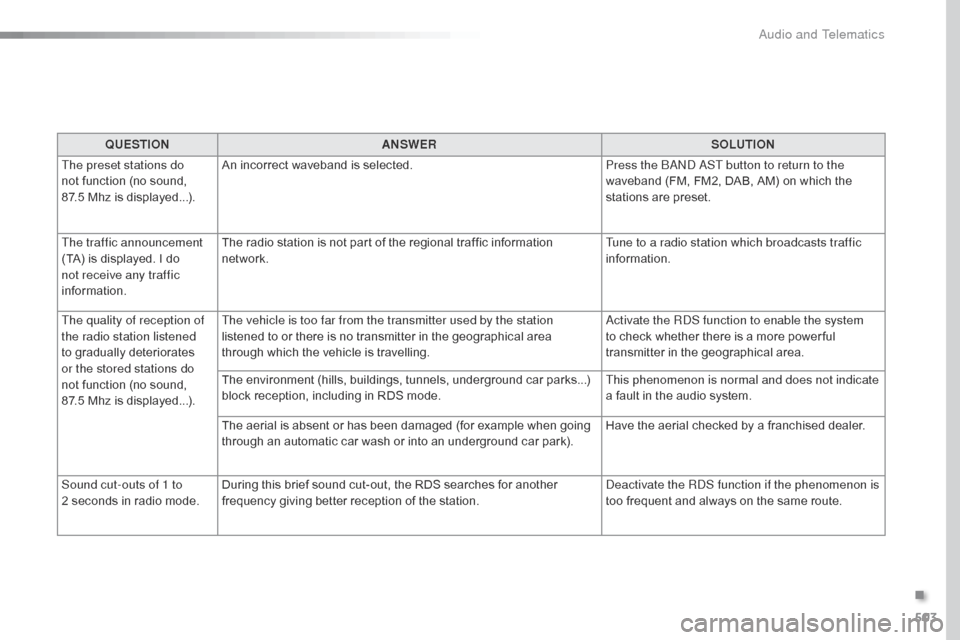
503
Jumpy_en_Chap10d_RD6_ed01-2016
QUESTIONANSWER SOLUTION
The preset stations do
not function (no sound,
87.5
Mhz is displayed...). An incorrect waveband is selected.
Press the BAND AST button to return to the
waveband (FM, FM2, DAB, AM) on which the
stations are preset.
The traffic announcement
(TA) is displayed. I do
not receive any traffic
information. The radio station is not part of the regional traffic information
network.
Tune to a radio station which broadcasts traffic
information.
The quality of reception of
the radio station listened
to gradually deteriorates
or the stored stations do
not function (no sound,
87.5
Mhz is displayed...). The vehicle is too far from the transmitter used by the station
listened to or there is no transmitter in the geographical area
through which the vehicle is travelling.
Activate the RDS function to enable the system
to check whether there is a more power ful
transmitter in the geographical area.
The environment (hills, buildings, tunnels, underground car parks...)
block reception, including in RDS mode. This phenomenon is normal and does not indicate
a fault in the audio system.
The aerial is absent or has been damaged (for example when going
through an automatic car wash or into an underground car park). Have the aerial checked by a franchised dealer.
Sound cut-outs of 1 to
2
seconds in radio mode. During this brief sound cut-out, the RDS searches for another
frequency giving better reception of the station. Deactivate the RDS function if the phenomenon is
too frequent and always on the same route.
.
Audio and Telematics
Page 509 of 595
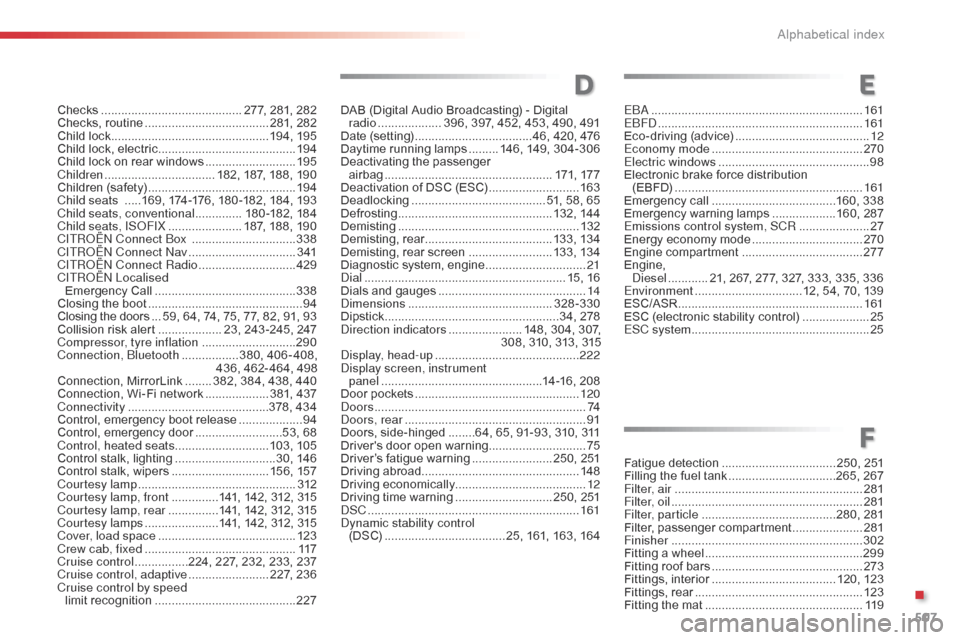
507
Jumpy_en_Chap11_index-alpha_ed01-2016
Checks .......................................... 277, 281, 282
Checks, routine ..................................... 2 81, 282
Child lock
...............................
................19 4, 195
Child lock, electric
...............................
..........19 4
Child lock on rear windows
...........................19
5
Children
...............................
.. 182, 187, 188, 190
Children (safety)
...............................
.............19 4
Child seats
.....1
69, 174-176, 180 -182, 184, 193
Child seats, conventional
.............. 18
0 -182, 18 4
Child seats, ISOFIX
...................... 1
87, 188, 190
C
ITROËN
C
onnect Box
...............................33
8
CITROËN Connect Nav
................................ 3
41
CITROËN Connect Radio
............................. 42
9
C
ITROËN
L
ocalised
Emergency Call
.......................................... 33
8
Closing the boot
...............................
...............94
Closing the doors
... 5
9, 64, 74, 75, 77, 82, 91, 93
Collision risk alert
................... 2
3, 243 -245, 247
Compressor, tyre inflation
............................ 29
0
Connection, Bluetooth
................. 3
80, 406 - 408,
436, 462- 464, 498
Connection, MirrorLink
........ 3
82, 384, 438, 440
Connection, Wi-Fi network
................... 3
81, 437
Connectivity
...............................
...........378, 434
Control, emergency boot release
...................94
C
ontrol, emergency door
..........................
53, 68
Control, heated seats
............................ 10
3, 105
Control stalk, lighting
..............................3
0, 146
Control stalk, wipers
.............................15
6, 157
Courtesy lamp
...............................
................312
Courtesy lamp, front
..............1
41, 142, 312, 315
Courtesy lamp, rear
...............1
41, 142, 312, 315
Courtesy lamps
......................1
41, 142, 312, 315
Cover, load space
......................................... 12
3
Crew cab, fixed
...............................
..............117
Cruise control
................2
24, 227, 232, 233, 237
Cruise control, adaptive
........................ 2
27, 236
Cruise control by speed limit recognition
.......................................... 2
27 Fatigue detection
..............................
.... 250, 251
Filling the fuel tank
................................2
65, 267
Filter, air
...............
.........................................281
Filter, oil
......................................................... 2
81
Filter, particle
........................................2
80, 281
Filter, passenger compartment
..................... 2
81
Finisher
..............................
...........................302
Fitting a wheel
...............................
................299
Fitting roof bars
.............................................2
73
Fittings, interior
..................................... 12
0, 123
Fittings, rear
...............................
...................123
Fitting the mat
...............................................11
9
D
F
E
DAB (Digital Audio Broadcasting) - Digital radio ............... .... 396, 397, 452, 453, 490, 491
Date (setting)
...............................
....46, 420, 476
Daytime running lamps
......... 1
46, 149, 304-306
Deactivating the passenger
airbag
.................................................. 17
1, 17 7
Deactivation of DSC (ESC)
...........................16
3
Deadlocking
...............................
......... 51, 58, 65
Defrosting
...............................
............... 132, 144
Demisting
...............................
.......................132
Demisting, rear
...................................... 13
3, 13 4
Demisting, rear screen
......................... 13
3, 13 4
Diagnostic system, engine
..............................21
D
ial
........
.................................................... 15, 16
Dials and gauges
............................................ 14
D
imensions
..............................
.............328-330
Dipstick
................
....................................34, 278
Direction indicators
...................... 1
48, 304, 307,
308, 310, 313, 315
Display, head-up
........................................... 2
22
Display screen, instrument panel
................................................1
4-16, 208
Door pockets
................................................. 12
0
Doors
..............................................................
.74
Doors, rear
...............................
.......................91
Doors, side-hinged
........6
4, 65, 91-93, 310, 311
Driver's door open warning
.............................75
D
river’s fatigue warning
........................ 2
50, 251
Driving abroad ............................................... 148
Driving economically ....................................... 12
Driving time warning
............................. 2
50, 251
DSC
............................................................... 16
1
Dynamic stability control (DSC)
.................................... 2
5, 161, 163, 164EBA .............................................................
..161
EBFD ...............................
..............................161
Eco-driving (advice)
........................................ 12
E
conomy mode
...............................
..............270
Electric windows
............................................. 98
E
lectronic brake force distribution
(EBFD)
...............................
.........................161
Emergency call
.....................................1
60, 338
Emergency warning lamps
...................1
60, 287
Emissions control system, SCR
.....................2
7
Energy economy mode
.................................2
70
Engine compartment
.................................... 2
77
Engine,
Diesel
............ 2
1, 267, 277, 327, 333, 335, 336
Environment
...............................
.12, 54, 70, 139
ESC/ASR
...............................
........................161
ESC (electronic stability control)
....................25
ES
C system
.....................................................25
.
Alphabetical index
Page 521 of 595

95
Transversal-Citroen_en_Chap02_RCC-2-2-0_ed01-2016
CITROËN Connect Radio
Multimedia audio system - Applications - Bluetooth® telephone
Contents
First steps
9 6
Steering mounted controls - Type 1
9
8
Steering mounted controls - Type 2
9
9
Menus
10 0
Applications
1
02
Radio Media
1
06
Telephone
118
Settings
1
32
Frequently asked questions
1
43
The system is protected in such a way
that it will only operate in your vehicle.
The display of the Energy Economy
Mode message signals that a change
to standby is imminent. The different functions and settings
described vary according to the version
and configuration of your vehicle.
The link below gives access to OSS
(Open Source Software) codes for the
system.
http://www.psa-peugeot-citroen.com/oss
As a safety measure and because it
requires sustained attention by the
driver, the pairing of a Bluetooth mobile
telephone with the Bluetooth hands-
free system of your audio system must
be done with the vehicle stationary
and the ignition on.
.
Audio and Telematics
Page 538 of 595
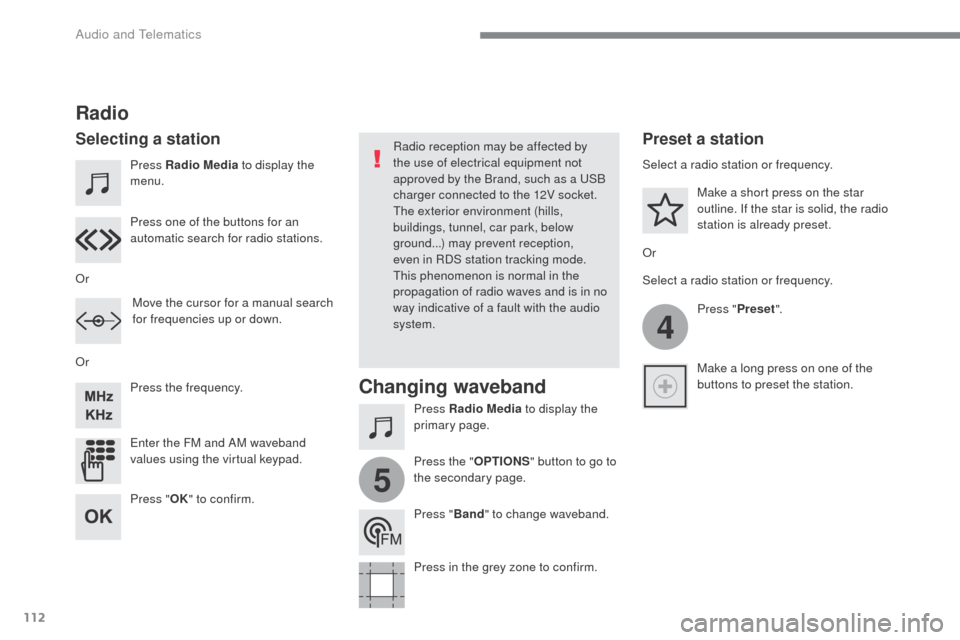
112
4
5
Transversal-Citroen_en_Chap02_RCC-2-2-0_ed01-2016
Press Radio Media to display the
menu.
Press Radio Media to display the
primary page.
Press the frequency.
Enter the FM and AM waveband
values using the virtual keypad. Press one of the buttons for an
automatic search for radio stations.
Radio
Selecting a stationRadio reception may be affected by
the use of electrical equipment not
approved by the Brand, such as a USB
charger connected to the 12V socket.
The exterior environment (hills,
buildings, tunnel, car park, below
ground...) may prevent reception,
even in RDS station tracking mode.
This phenomenon is normal in the
propagation of radio waves and is in no
way indicative of a fault with the audio
system.
Or
Or
Or Move the cursor for a manual search
for frequencies up or down. Select a radio station or frequency.
Select a radio station or frequency.
Press "Preset".
Press the " OPTIONS" button to go to
the secondary page. Make a short press on the star
outline. If the star is solid, the radio
station is already preset.
Make a long press on one of the
buttons to preset the station.
Press " Band" to change waveband.
Press in the grey zone to confirm.Preset a station
Changing waveband
Press " OK" to confirm.
Audio and Telematics
Page 542 of 595

116
1
Transversal-Citroen_en_Chap02_RCC-2-2-0_ed01-2016
Media
USB portSelecting the source
Press the "SOURCES " button.
Press Radio Media
to display the
primary page.
The system builds playlists (in temporary
memory), an operation which can take from
a few seconds to several minutes at the first
connection.
Reduce the number of non-music files and the
number of folders to reduce the waiting time.
The playlists are updated every time the
ignition is switched off or connection of a USB
memory stick. The lists are memorised: if they
are not modified, the subsequent loading time
will be shorter. Insert the USB memory stick in the USB port or
connect the USB device to the USB port using
a suitable cable (not supplied).
Auxiliary socket (AUX)
First adjust the volume of your portable device
(to a high level). Then adjust the volume of your
audio system.
Display and management of the controls are
via the portable device. This source is only available if "Auxiliary input"
has been checked in the audio settings.
Connect the portable device (MP3 player…) to
the auxiliary Jack socket using an audio cable
(not supplied). Choose the source.
Bluetooth Streaming®
Streaming allows you to listen to music from
your telephone.
The Bluetooth profile must be activated. First
adjust the volume on your portable device (to a
high level).
Then adjust the volume of your system.
If play does not start automatically, it may be
necessary to start the audio playback from the
smartphone.
Control is from the portable device or by using
the system's touch buttons.
Once connected in Streaming mode,
the smartphone is considered to be a
media source.
To protect the system, do not use a
USB hub.
Audio and Telematics
Page 543 of 595
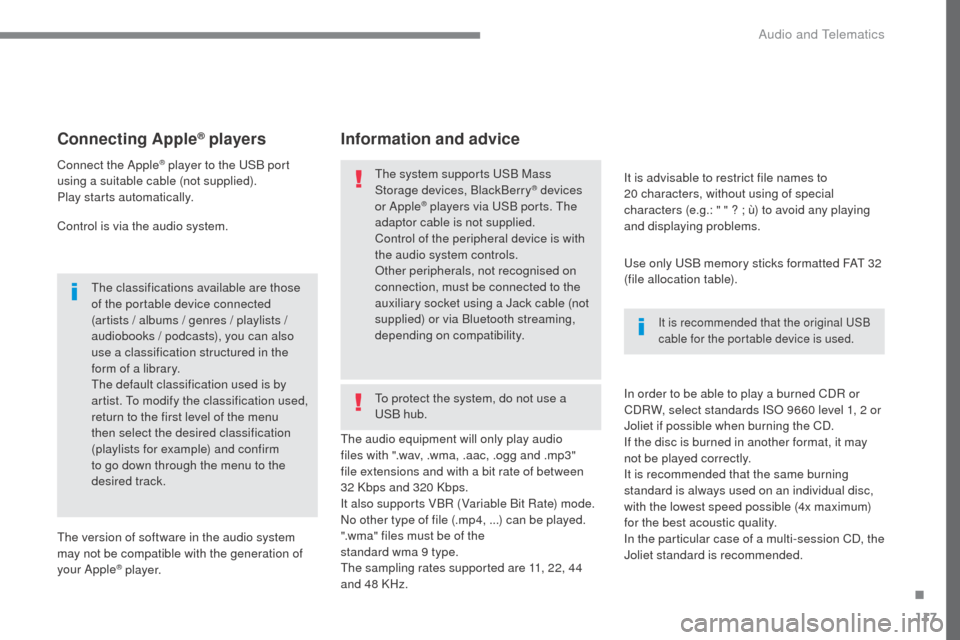
117
Transversal-Citroen_en_Chap02_RCC-2-2-0_ed01-2016
Connecting Apple® players
Connect the Apple® player to the USB port
using a suitable cable (not supplied).
Play starts automatically.
Control is via the audio system.
The classifications available are those
of the portable device connected
(artists / albums / genres / playlists /
audiobooks / podcasts), you can also
use a classification structured in the
form of a library.
The default classification used is by
artist. To modify the classification used,
return to the first level of the menu
then select the desired classification
(playlists for example) and confirm
to go down through the menu to the
desired track.
The version of software in the audio system
may not be compatible with the generation of
your Apple
® p l aye r. The audio equipment will only play audio
files with ".wav, .wma, .aac, .ogg and .mp3"
file extensions and with a bit rate of between
32
Kbps and 320 Kbps.
It also supports VBR (Variable Bit Rate) mode.
No other type of file (.mp4, ...) can be played.
".wma" files must be of the
standard wma 9 type.
The sampling rates supported are 11, 22, 44
and 48 KHz. It is advisable to restrict file names to
20
characters, without using of special
characters (e.g.: " " ? ; ù) to avoid any playing
and displaying problems.
In order to be able to play a burned CDR or
CDRW, select standards ISO 9660 level 1, 2 or
Joliet if possible when burning the CD.
If the disc is burned in another format, it may
not be played correctly.
It is recommended that the same burning
standard is always used on an individual disc,
with the lowest speed possible (4x maximum)
for the best acoustic quality.
In the particular case of a multi-session CD, the
Joliet standard is recommended.
Information and advice
Use only USB memory sticks formatted FAT 32
(file allocation table).
The system supports USB Mass
Storage devices, BlackBerry
® devices
or Apple® players via USB ports. The
adaptor cable is not supplied.
Control of the peripheral device is with
the audio system controls.
Other peripherals, not recognised on
connection, must be connected to the
auxiliary socket using a Jack cable (not
supplied) or via Bluetooth streaming,
depending on compatibility.
It is recommended that the original USB
cable for the portable device is used.
To protect the system, do not use a
USB hub.
.
Audio and Telematics
Page 553 of 595
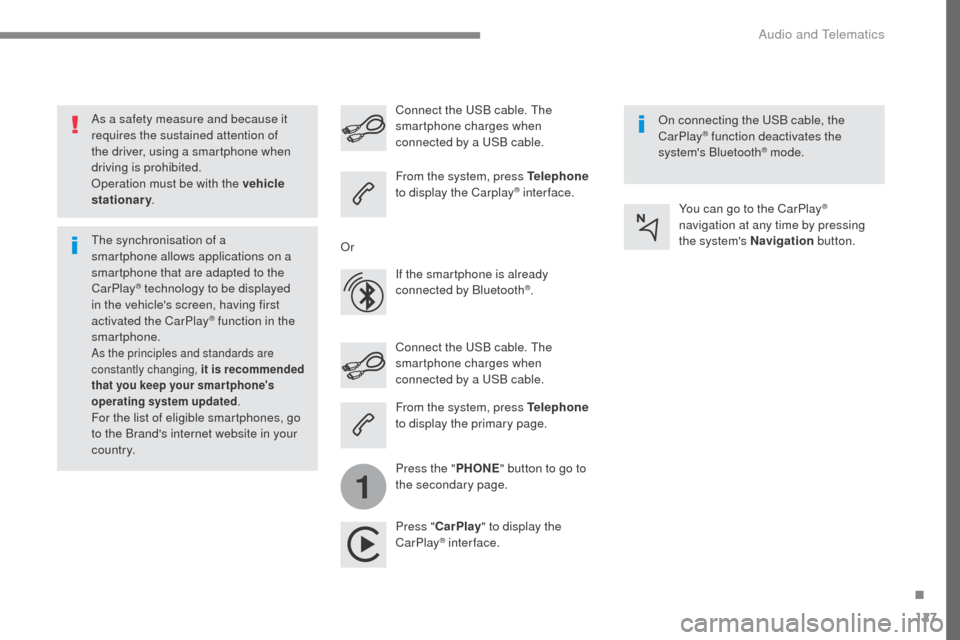
127
1
Transversal-Citroen_en_Chap02_RCC-2-2-0_ed01-2016
As a safety measure and because it
requires the sustained attention of
the driver, using a smartphone when
driving is prohibited.
Operation must be with the vehicle
stationary.
The synchronisation of a
smartphone allows applications on a
smartphone that are adapted to the
CarPlay
® technology to be displayed
i
n the vehicle's screen, having first
activated the CarPlay
® function in the
smartphone.
As the principles and standards are
constantly changing, it is recommended
that you keep your smar tphone's
operating system updated .
For the list of eligible smartphones, go
to the Brand's internet website in your
c o unt r y. Connect the USB cable. The
smartphone charges when
connected by a USB cable. Connect the USB cable. The
smartphone charges when
connected by a USB cable.
From the system, press Telephone
to display the Carplay
® inter face.
Press " CarPlay " to display the
CarPlay
® inter face. On connecting the USB cable, the
CarPlay
® function deactivates the
system's Bluetooth® mode.
From the system, press Telephone
to display the primary page.
Press the " PHONE" button to go to
the secondary page.
Or
If the smartphone is already
connected by Bluetooth
®. You can go to the CarPlay
®
navigation at any time by pressing
the system's Navigation button.
.
Audio and Telematics
Page 572 of 595

146
Transversal-Citroen_en_Chap02_RCC-2-2-0_ed01-2016
QUESTIONANS wE RSOLUTION
In changing the setting
of treble and bass the
equalizer setting is
deselected. The selection of an equalizer setting imposes the settings for treble
and bass and vice-versa.
Modify the treble and bass or equalizer settings to
obtain the desired musical ambience.
In changing the equalizer
setting, treble and bass
return to zero.
When changing the
balance settings, the
distribution setting is
deselected. The selection of a distribution setting imposes the balance settings
and vice-versa.
Modify the balance or distribution settings to
obtain the desired musical ambience.
When changing a
distribution setting,
the balance setting is
deselected.
There is a difference in
sound quality between the
different audio sources. For optimum sound quality, the audio settings can be adapted to
the different sound sources, which may result in audible differences
when changing source. Check that the audio settings are adapted to the
sources listened to. Adjust the audio functions to
the middle position.
With the engine off, the
system switches off after a
few minutes of use. When the engine is switched off, the system's operating time
depends on the state of charge of the battery.
The switch-off is normal: the system switches to economy mode and
switches off to prevent discharging of the vehicle's battery. Start the vehicle's engine to increase the battery
charge.
Settings
Audio and Telematics